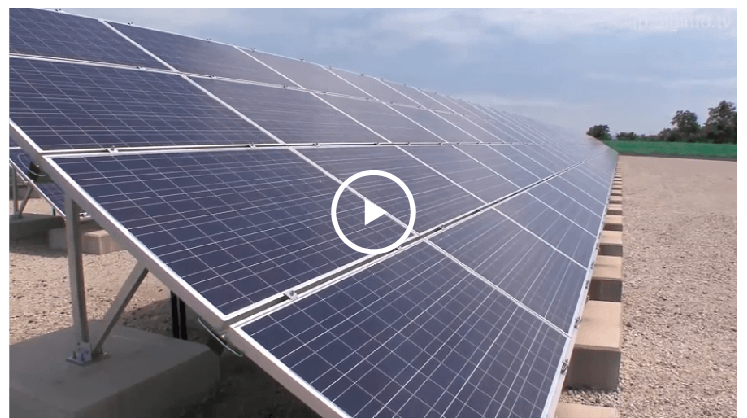Biodiesel Fuel business
BDF (biodiesel fuel) is an alternative fuel to light oil. We chemically process used oil from tempura fried food (waste cooking oil) provided by homes and companies, into fuel for diesel engines. The fuel is a resource recycling type fuel which reuses waste cooking oil. Since it is made from plants, the energy is renewable as far as plant exists and is friendly to global environment.
●BDF1 Fuel purified by chemical reaction
●BDF2 Fuel completely purified by distillation after chemical reaction
Our initiatives
The BDF business we are promoting is a difficult one, because the legislation is not well established and the manufacturing costs are high compared to those of light oil. However, we need to keep moving forward to build and nurture a future society based on recycling. We also need to take action to reduce CO2 emissions. In this context, the number of inquiries about construction orders from public agencies and road construction orders from NEXCO etc., all from the standpoint of green procurement and reducing CO2 emissions, is rapidly increasing.
We need to cooperate with the parties below to establish an environment in which the biodiesel fuel business can be profitable for all of us:
1) Relating policy-making ministries and agencies;
2) BDF users; and
3) Everyone who can provide waste cooking oil.
In view of the reductions in CO2 emissions which are being demanded of all companies and in anticipation of the trade in CO2 emissions, we think that now more than ever, action is necessary on the business we are proposing here. Please use BDF to develop your company’s business.
* We also ask you to cooperate with the reuse of waste cooking oil.
Conventional BDF
Under circumstances in which a principal government agency has not been determined, companies and groups of citizen have been independently manufacturing BDF from various materials (palm oil, rapeseed oil, sunflower oil, waste cooking oil) and using BDF as a fuel for heavy machinery at nearby construction sites and for trucks over short distances. Due to the lack of standards, there are some very poor quality fuels among the different kinds of BDF being sold. (Very impure, high moisture content, incomplete removal of glycerol, etc.) This is continually causing problems with vehicles. In this situation, the Ministry of Economy, Trade and Industry(METI) is aiming to standardize BDF (the Act Concerning the Maintenance of the Quality of Gasoline, etc., and JIS Standards), and the Ministry of Land, Infrastructure, Transport and Tourism(MLIT) has brought into force standards for commercial mixed light oils (B5 mixed light oils).
Meeting standards like the Act Concerning the Maintenance of Quality of Gasoline and JIS-K2390 has been incurring large manufacturing costs.
The present status of manufacturers who comply with JIS-K2390
≪according to the list of manufacturers who have sent notification to METI≫
- Number of BDF manufacturers
- Many *Unknown, as notification is not mandatory
- Number of manufacturers who manufacture products compliant with JIS-K2390
- 15 companies (including research institutions) * 6 companies in operation
- Of the above 15 companies, the number of manufacturers who manufacture compliant products from waste cooking oil
- A few
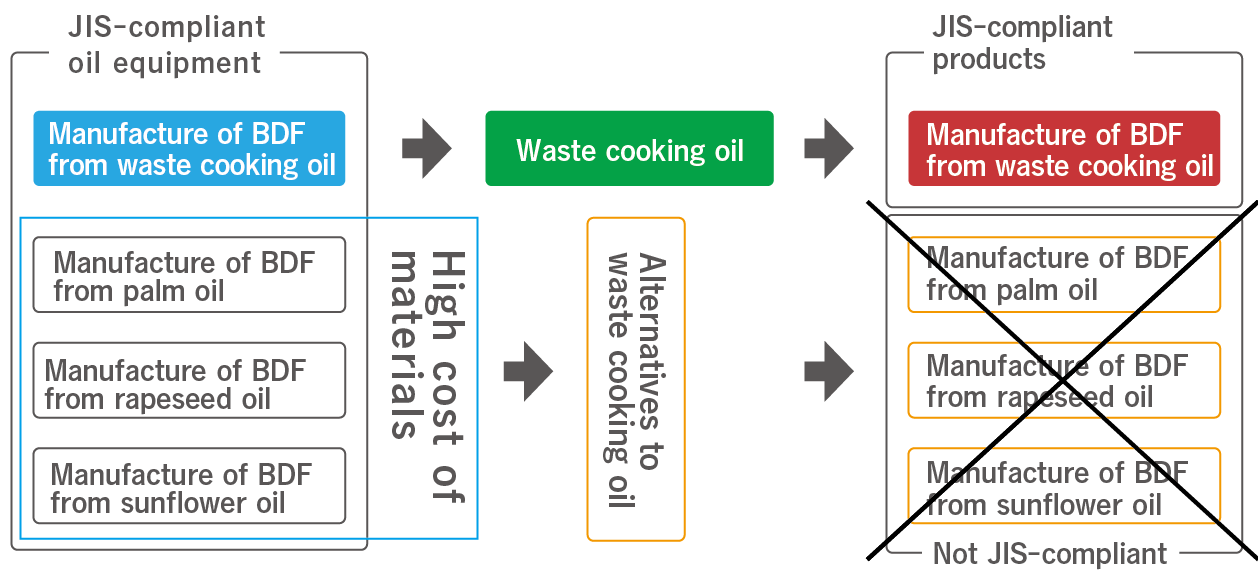
Current status of BDF plants
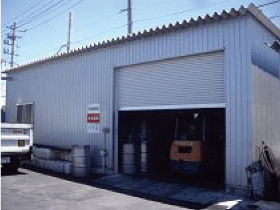
- BDF Manufacturing Plant No. 1 building
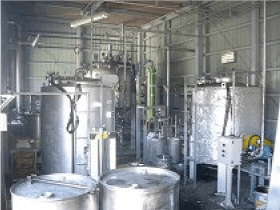
- BDF Manufacturing Plant No. 1, full view
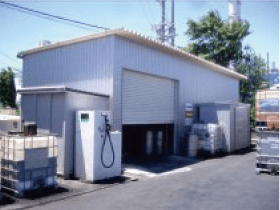
- BDF Manufacturing Plant No. 2 building
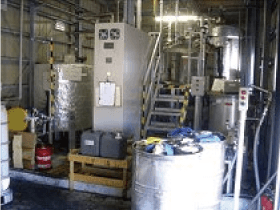
- BDF Manufacturing Plant No. 2, full view
- BDF distillation purifying apparatus
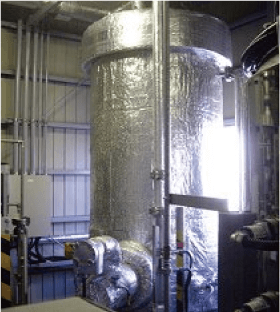
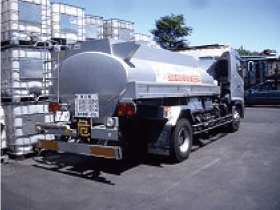
- 4K tank lorry for delivering
BDF production flow
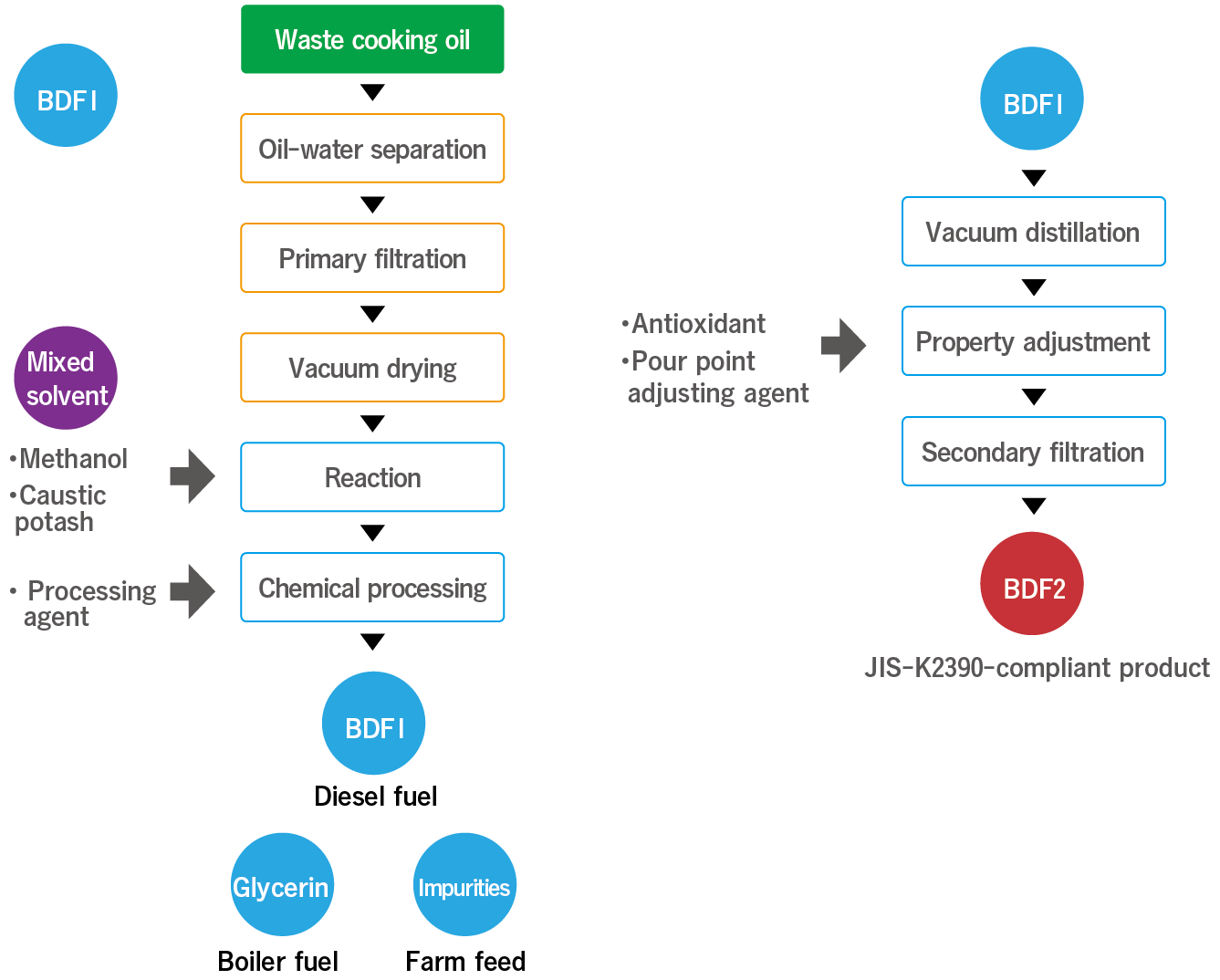
Administrative agencies’ initiatives/guidelines for BDF
Ministry of Environment(MOE)/Ministry of Agriculture, Forestry and Fisheries(MAFF)
Fully promote specific countermeasure for CO2 emission reduction. B100・B50・B40・B5
Ministry of Economy, Trade and Industry (METI)
At present, METI is observing the opposing guidelines of MOE and MLIT. It also issues licenses and approval related to the production of B5 mixed light oil.
Ministry of Land, Infrastructure, Transport and Tourism(MLIT)
B100 fuel is an untaxed product according to current taxation.
To protect tax revenue from the trade of light oil, which was being handled as a source of revenue for road construction, Japanese government encourages each automobile manufacturer/organization to use BDF at a level of up to B5 (5% admixture). The tax revenue of 32.1 yen/L from the trade of light oil is secured by mixing.
Ministry of Internal Affairs and Communications (MIC) / local governments
Prefectural governments’ environment divisions are promoting the expansion of the introduction of biofuels as a priority measure.

